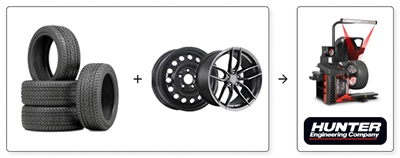When to change for winter tires?

Why should we equip our vehicles with tires specifically designed for winter?
To fully understand the importance of not keeping summer tires or all-season tires during the winter season, it is important to know that the materials of a winter tire are specifically designed to adapt to the harsh winter climate. At a temperature of 7 degrees Celsius or less, summer or all-season tire performance is considerably reduced, compromising handling, stability, braking capacity and grip, characteristics essential for a safe driving experience.
The temperature impact on the tire tread compound is as follows: when it is hot and the road surface reaches high temperatures, the tire rubber will tend to soften, while conversely when the temperature drops and the road surface becomes cold, the tire will harden. When the tread sets, the tire sticks less to the road, so traction and grip are significantly reduced, and the risk of skidding increases.
This is why the type of rubber used in the tread of a winter tire is different from that used for summer or 4-season tires. Today's advanced technologies have made it possible to develop a rubber compound that resists the cold and remains flexible at low temperatures, thanks to special oils and other compounds, ensuring safe driving in winter conditions.
According to tests conducted by the Federal Government, winter tires in good condition maintain tire elasticity down to -40°C and reduce braking distance by 25%.
When should I change my summer / 4 season tires for winter tires?
Since the tread of summer or 4-season tire hardens at low temperatures, the 7 degree Celsius mark is set as the reference point for winter tire installation. Even if the maximum temperature during the day reaches a higher threshold, it is the minimum temperature that should be considered since this is the temperature at which you will drive in the morning and evening.
In Quebec, the law stipulates that your vehicle must be shod for winter from December 1st to March 15th. However, since spring weather conditions can be variable, we recommend that you wait a few weeks after the end of this period before installing your all-season or summer tires.
Are there any exceptions in the province of Quebec?
The obligation to have winter tires in Quebec does not apply to
-
Spare wheels on vehicles;
-
Vehicles for which the SAAQ has issued an exemption certificate for winter tires
-
Heavy vehicles;
-
Farm machinery;
-
If you purchase a vehicle from a dealer, you have seven days following the date of purchase of the vehicle (you must have the contract of sale of the vehicle or a copy of it);
-
The seven days before the expiry of the lease of the vehicle for a term of one year or more (you must have the lease agreement or a copy of it);
-
Vehicles with removable license plates (X-plates);
-
Vehicles bearing a temporary (in-transit) registration certificate for the period of validity indicated on the certificate, not to exceed seven days from the date of issue of the certificate
-
Motor homes, which are motor vehicles permanently converted into a dwelling.


